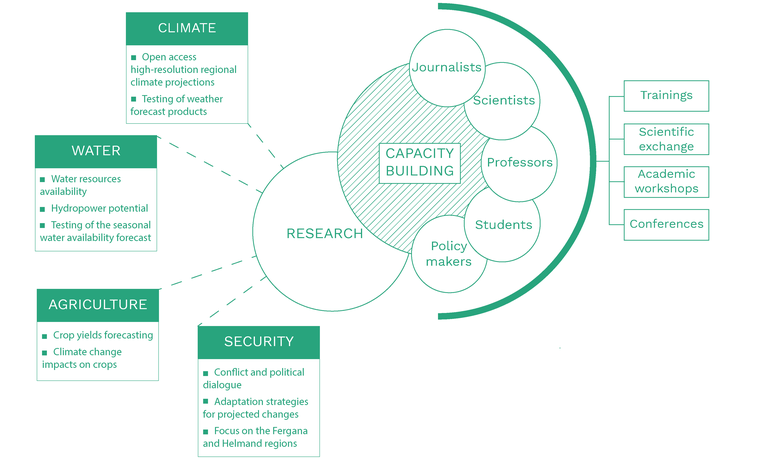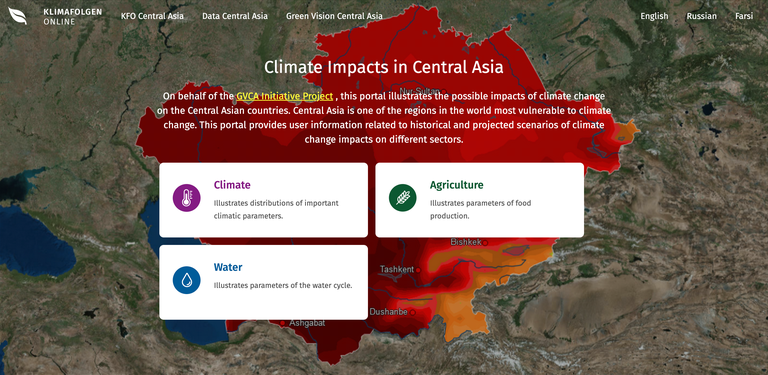
In January 2020, the German Federal Foreign Office launched Green Central Asia, a regional initiative on climate and security in Central Asia and Afghanistan. The Green Central Asia Initiative will enable regional dialogue on climate change impacts and risks and is implemented by four partners – German Development Agency GIZ, German-Kazakh University DKU, German Research Centre for Geosciences GFZ and Potsdam Institute for Climate Impact Research PIK.
Within GCA PIK will deepen scientific understanding of climate impacts and risks to water, agriculture and security in Central Asia and Afghanistan and will support different local stakeholder groups in developing the local capacities in the field of climate services, impact modelling and integrated water resource management. Specifically, the project will work towards:

Information flyers
 |
 |
Capacity Building
Strengthening and developing the local capacities in the area of sustainable resources management, climate impact assessment and transboundary cooperation, targeting different expert and stakeholder groups through technical and educational workshops for staff of governmental structures, university professors and students, local journalists and policymakers. The workshop material will be developed in close cooperation with local stakeholders and will be tailored to their needs. Additionally, local experts will be given an opportunity to conduct fully-funded short research visits at PIK. Datasets and materials, developed within the project will be deployed to the local stakeholders.
Contact Persons:
 |
 |
| Dr. Iulii Didovets | Stefanie Wesch |
Water
Assessment of climate change impacts on water resources of the main river basins in Central Asia and Afghanistan by applying eco-hydrological modelling and state of the art climate projections. Working closely with local stakeholders, PIK will provide assessments of projected changes in hydroclimatic extremes and explore the operation of existing and planned reservoirs in the region under climate change, including their hydropower potential. Additionally, the possibility to provide short/mid-term forecast of river discharge for the spring flood and vegetation period using weather forecasts will be tested.
Contact Persons:
 |
 |
| Dr. Iulii Didovets | Dr. Fred Hattermann |
Climate
Creation of open access, high-resolution climate change projections dataset, developed specifically for the region. It will aim to tackle the complex regional orographic conditions and will be tailored to the needs of the impact modellers. Performance of physical as well as statistical downscaling for global climate simulations will be explored in depth. PIK will also work towards the assessment of the applicability of mid-term weather forecasts in the region.
Contact Person:
 |
| Dr. Bijan Fallah |
Agriculture
Supplementing the existing agricultural information systems by risk assessments under changing climate conditions, in particular extreme weather events, in short and mid-term. Semi-empirical model analyses will be co-developed with local and (inter)national experts from academia as well as stakeholders from governments, NGOs and civil society in the region. Our work focuses on the main crops in the target area: wheat, barley, maize and cotton. Agriculture is largely dependent on the water availability in the region, in particular for cotton production. Early warning of crop risks may enable swift adaptation, including better water management.
Contact Persons:
 |
 |
 |
 |
| Dr. Qaisar Saddique | Paula Romanovska |
Dr. Bernhard Schauberger | Dr. Christoph Gornott |
Security
Assessment of current levels of political dialogue among Central Asian states plus Afghanistan and exploration of additional or alternative mechanisms with the aim of fostering transboundary cooperation Analysis of the potential for social conflict between cohorts under projected scenarios. Evaluation of strategies for affected communities to cope with projected changes and increase cooperation between social groups.
Contact Person:
 |
|
| Stefanie Wesch |
Climate Impacts Online
On behalf of the GVCA Initiative Project , the portal "Climate Impacts Online" illustrates the possible impacts of climate change on the Central Asian countries. Central Asia is one of the regions in the world most vulnerable to climate change. This portal provides user information related to historical and projected scenarios of climate change impacts on different sectors.






